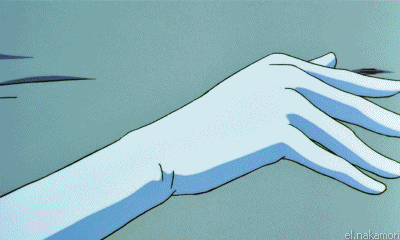This is the diary of a very nerdy girl. She is an English major hoping to become a writer, a fan of Sailor Moon and Harvest Moon who philosophizes a lot. Kino no Tabi and the novels of Vladimir Nabokov and Keiichi Sigsawa are her joy. These things and whatever else may catch her nerdy, eclectic interest shall be the subject of this blog. She sometimes likes to speak in third person.
Last active 2 hours ago
Don't wanna be here? Send us removal request.
Text
June 30th is Usagi “Chibi-Usa” Small Lady Tsukino/Sailor Chibi Moon’s Birthday!
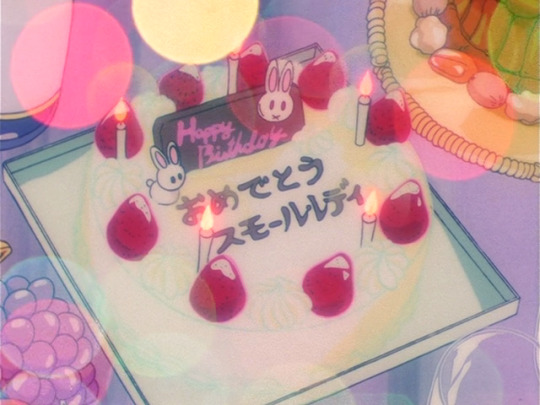
So how can you celebrate?
☾ Rewatch or reread your favourite Cheebs-centric chapter, episode, or musical! She is a pivotal character in both the second and fourth story arcs of the manga and both anime series, and plays a key role in many musicals based on those same story arcs. Particular highlights from those seasons from the classic anime include episode 060, her introduction; episodes 073 and 074, where her distrust and frustration towards Usagi comes to a head and they work together to defeat Rubeus; episode 075, where her dream is hijacked by a Droid and the Sailor Guardians must earn the trust of a Chibi-Usa who has never met them before; episode 085, where Wiseman manipulates her into becoming the evil Wicked Lady, and episode 088, where she is finally restored; episode 104, where she travels back from the future to rejoin the Sailor Team (though technically she appears at the end of episode 103); and episode 158, where Palla Palla swaps her and Usagi’s ages for a day.
Did you know there are even some manga side-stories focused specially on her? “Chibi-Usa’s Picture Diary” is a series of four short comics based on Chibi-Usa’s adventures with her friends. Kodansha has released these officially in Sailor Moon Short Stories Vol. 1.
☾ Chibi-Usa has several official image songs across different canons you can play for her big day:
90s Anime: Yume wo Ijimenaide [“Don’t Tease My Dreams”]; Bai Bai tte Itta [“I’ll Say Bye-Bye”] Crystal: Otome no Susume [ “A Maiden’s Recommendation”]; Musicals: Mata Mata Chibi-Usa Desu [“Chibi-Usa’s Back Again”]; Chibi-Usa no Hanran [“Chibi-Usa’s Rebellion”]; PINKY TYPHOON; Chibi-Usa no Kokoroiki [“Chibi-Usa’s Disposition”]; Chibi-Usa no Umi [“Chibi-Usa’s Ocean”] She also had a duet with Hotaru Tomoe/Sailor Saturn in Un Nouveau Voyage, Chiisa na Kagayaki [“A Small Glimmer”].
She also has a few songs related to her evil alter-ego, “Wicked Lady”:
BLACK MOON SIGNAL; Kono Kodou Kara Yoru wa Umarenai [“The Night Won’t be Born From This Pulse”] as a solo (CD release) or duet (live recording)
Here’s a playlist of these songs and other Chibi Moon BGM cues!
☾ Indulge in Chibi-Usa’s favourite foods! Like her mother, she has a major sweet tooth - in particular, she loves purin, which while often translated as “pudding” refers to a specific Japanese dessert similar to flan. She also loves pancakes, particularly those made by her mother figure Ikuko - try adding blueberries!
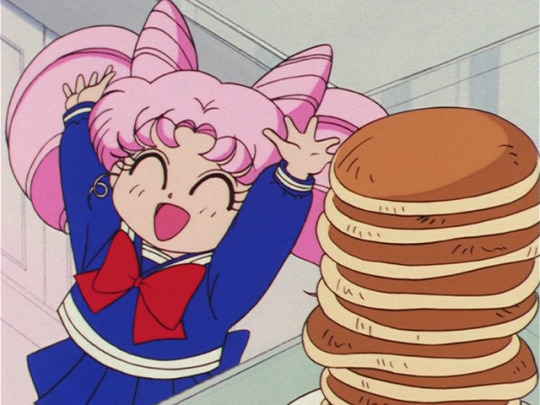
Or, you could bake Chibi-Usa’s specialty, apple pie with a lattice crust, or some animal-shaped cookies with sparkly little decorations - but keep in mind the best cookies are the ones which might look a little funny, but taste delicious! Just remember to brush your teeth later or risk a visit to the ~haunted dentist~.
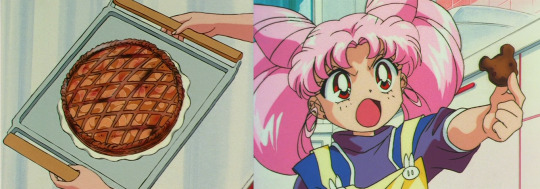
Again like her mother, her least favourite food is carrots - despite their namesake - so you might prefer to skip them for the day.
☾ Chibi-Usa is still figuring out what she likes and practices a lot of hobbies over the course of the series. That said, she is consistently shown to be a passionate and talented artist! She likes to paint and draw and, although she finds it difficult, also enjoys sculpting. Why not break out the old watercolour paints or air-dry clay? You could also ask a family member you admire to pose for some life-drawing practice. (Just don’t be offended if they’re a little vain.)

☾ Chibi-Usa liked to perform little magic tricks to cheer people up, a habit she learned from her guardian figure Sailor Pluto - “if you feel sad, say the magic word ‘abracadabra’ and you’ll soon feel happy again.” Of course, Chibi-Usa had the assistance of her magical tech-toy “Luna-P,” which could transform into objects at will, but that doesn’t mean you can’t learn some sleight-of-hand to brighten someone’s day!
☾ Dress like Chibi-Usa for the day! Despite being a kid, she has a very mature sense of style, and often dresses quite sophisticatedly; perhaps a reflection of her desire to be grown up. She’s often seen wearing an imitation of a Japanese school uniform, so it might be time to wear something uniformy-but-cute yourself. When not mimicking a sailor suit, she trends between two extremes; regal layers and frills with darker, richer colours, or bright, sporty, and colour-blocked to emphasize her youthful energy. Common colours are blues, grey, and yellow. Her favourite accessories included red-and-white ribboned saddle shoes, a backpack shaped (or even made out of) a stuffed toy, a hairbow matched to her outfit, and a broad sunhat with red ribbon gifted to her by Ikuko.
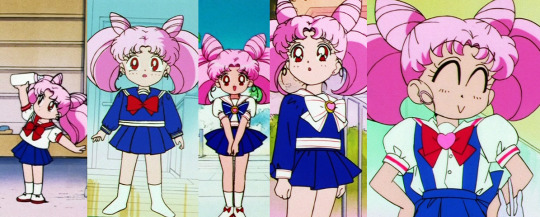
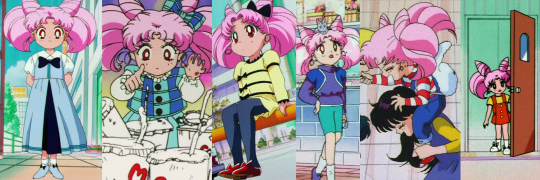
As Sailor Chibi Moon, her uniform is similar to Sailor Moon’s but with even more hearts, so if you have any loveheart-shaped accessories it’s time to PILE them on. Her image colours are sugar pink and red.
Chibi-Usa’s hairstyle might seem like a physical impossibility - her creator Naoko Takeuchi certainly thought so - but believe it or not, it’s possible to do yourself without a wig or extensions! Follow a tutorial like the one below to nail that signature pinecone-odango-head look.
youtube
☾ If you’re one of those fans who vehemently dislikes Chibi-Usa, take today as an opportunity let go of the hatred in your heart. Healing starts today.
☾ ‼ DO NOT ‼ touch random crystals that don’t belong to you. Trust us.
☾ Fav and read some Sailor Chibi Moon fanart and fanfic on sites like DeviantART, Twitter and AO3 - or contribute your own new content! Don’t forget to tag!
Feel free to reply and reblog with your own ideas of how you’re going to celebrate Chibi-Usa’s day!
Happy Birthday, Cheebs!
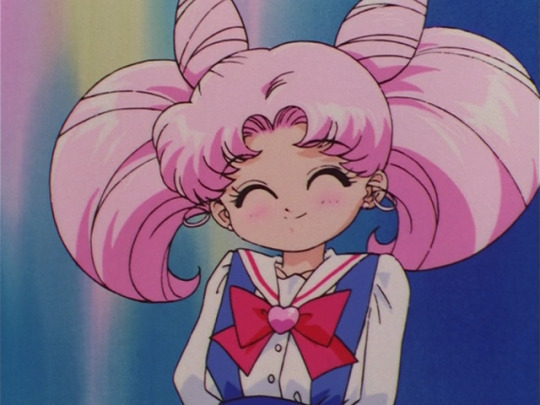
also I think it’s someone else’s birthday too but I can’t remember 🤔
#Happy birthday to my baby girl.#Chibi-Usa#Chibiusa#Sailor Moon#Sailor Chibi Moon#30th Century Baby Girl#I love her.
1K notes
·
View notes
Text
A Piece of History: The Bokujou Monogatari GB Wristwatch!
The year is 1997, Hong Kong is no longer a British colony, Deep Blue, a computer, has defeated a legendary Chess master, and for a gaming enthusiast in Japan, a TV commercial has just aired featuring the up-and-coming stars Aki Maeda and her sister, Ai Maeda.

抽選で2000名様に
オリジナルウォッチプレゼント
Not only is the genre defining Life Sim for Super Famicom, Bokujō Monogatari, getting a conversion for GameBoy on December 19th 1997, there will be 2000 fans drawn to potentially be able to get a cool wrist-watch!
Now, in the year 2020, the wristwatch has become one of the rarest pieces of Story of Seasons memorabilia around. Not only was it limited to 2000 pieces, but multiple variants would be confirmed to exist thus far: A blue one with a chicken charm, featured in the ad, and sold once upon a time on Etsy by MetropolisofRuin (formerly VintageGamesAndMerch) …

A watch with a red strap and horse charm, which we know of thanks to none other than Igusa Matsuyama, the series artist having it appear on their blog once upon a time…

And now, most recently, the discovery of a watch with a green strap and a dog charm! Ranch Story has actually managed to obtain one of these elusive watches, and in an opportunity provided only by the original packaging being practically destroyed and in non-collector condition, we can get a nice, close-up look at the watch itself!

Y’know, for being 23 years old and improperly stored, I’m actually really surprised at how clean and clear the graphic and water are! Overall, it seems to be in pretty good condition. The wrist strap itself also has a very… fruit gummi-like feel, for lack of a better description. I’m thankful it managed to stay so clean.

Naturally, the watch doesn’t actually run… but the battery compartment looks pretty okay. No obvious corrosion going on at least.. It’s tempting to open the thing and actually install a new battery to see the watch tick again, but for now I’ll resist the temptation. I definitely should try at some point, just to see if it has any unique sounds.

All in all, it’s a unique little piece of Story of Seasons history that I never expected to see in-person. It’s not the absolute rarest piece of merchandise for the series; that honor probably goes to another Japanese raffle prize like the Mukumuku or Pig plushes, but it’s nevertheless a delight to be able to share some close-ups of this rare little novelty.
#The way I gasped seeing Ai Maeda.#As someone obsessed with the 2003 adaptation of Kino's Journey where she voices Kino throughout my teen years...#Baby me loved her. I own a physical copy of her CD. I originally saw Linda Linda Linda because her sister is in it.#And I also grew up with Harvest Moon 64.#I was not expecting this crossover.#Harvest Moon#Ranch Story#Bokujou Monogatari#Story of Seasons
133 notes
·
View notes
Text
If I had a nickel for everyone video game princess from a Nintendo franchise who shares a name with a famous flapper with a connection to F. Scott Fitzgerald, I'd have two nickels. Which isn't a lot, but it's weird it happened twice.
#Nintendo#Super Mario#Princess Daisy#Daisy Buchanan#The Great Gatsby#The Legend of Zelda#Princess Zelda#Zelda Fitzgerald
5 notes
·
View notes
Photo
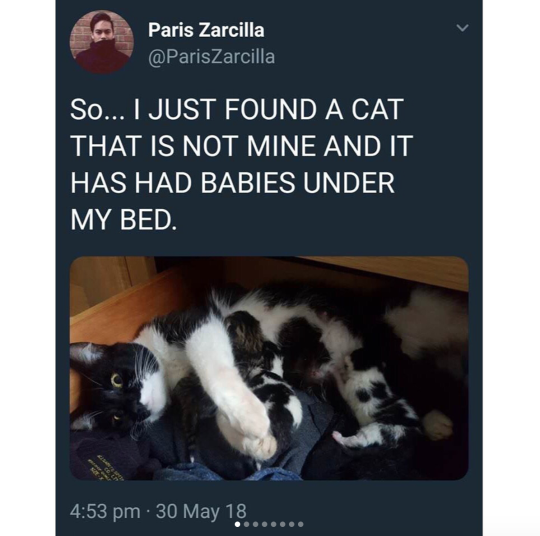
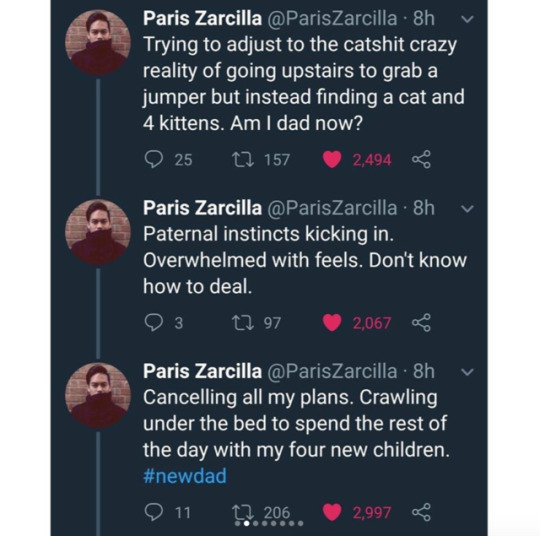
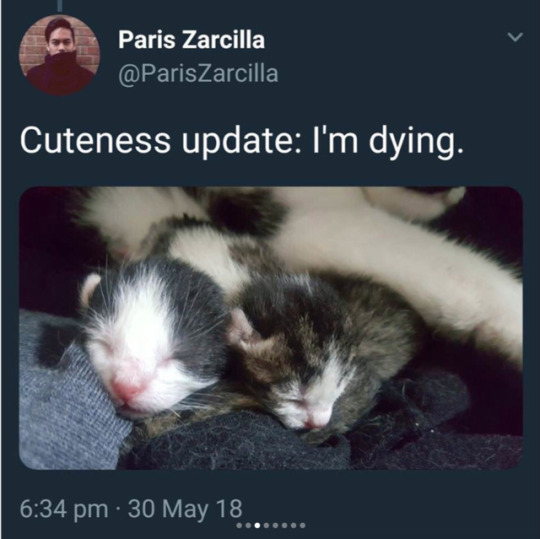




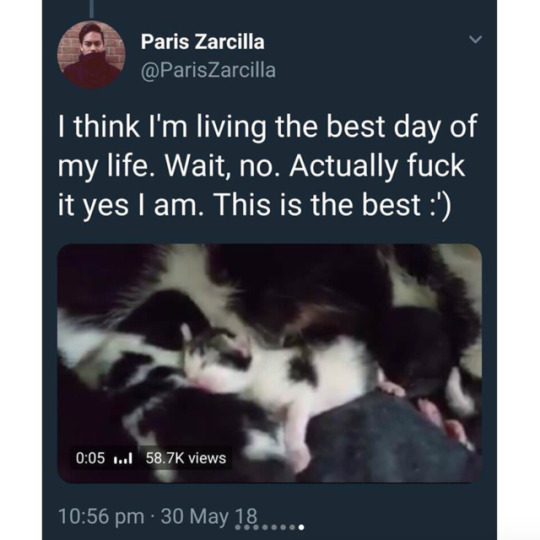
This is so wholesome
928K notes
·
View notes
Text
Two Different Timelines
IT IS HIGHLY SUGGESTED YOU DO NOT READ THIS IF YOU HAVE NOT FINISHED THE ENTIRE ANNE OF GREEN GABLES SERIES (ANNE OF GREEN GABLES, ANNE OF AVONLEA, ANNE OF THE ISLAND, ANNE OF WINDY POPLARS/ANNE OF WINDY WILLOWS, ANNE’S HOUSE OF DREAMS, ANNE OF INGLESIDE, RAINBOW VALLEY, AND RILLA OF INGLESIDE). YOU HAVE BEEN WARNED.
Believe it or not, there are two ways we can look at the timeline of the Anne of Green Gables series. The first way is what I guess you would call the traditional way, and the second way is one that I truthfully, just recently realized, and is based on content.
Keep reading
#Anne of Green Gables#L.M. Montgomery#There's only one person in the world who has thought more about the Anne timeline than me and this is them.#I went with the 1870s timeline for Castles in the Air for a couple of reasons.#1. It fit better with Louisa May Alcott's writing and meant that I could have one start decade no matter where your game is set.#2. I didn't want the spector of WWI hanging over adulthood in every single game.#That really messes with the slice of life aspect of the game and would do a lot to change the tone.#Let WWI be a little treat for groups interested enough to tackle more than one generation or move the timeline.#3. The Gilded Age is really interesting in its own right and I enjoy exploring it.#But I will be the first to acknowledge that the Anne timeline doesn't make sense.#There's no one set of dates where everything is magically going to work.#The 1870s just fit my purposes better than the 1890s.#Castles in the Air#Castles in the Air rpg#Game dev talk in the tags.
114 notes
·
View notes
Text
Given that I have read the books multiple times, you would think I would be prepared for episodes 7 and 8 of Anne Shirley, and yet...
7 notes
·
View notes
Text
Reblog to put one of these in your mutuals’ pocket when they’re not looking


326K notes
·
View notes
Text
Celebrating the Digital Release of Castles in the Air!

This past week, the culmination of five years of work has come together in the digital release of Castles in the Air (CitA), a tabletop RPG designed by me and inspired by the writing of Louisa May Alcott (Little Women) and LM Montgomery (Anne of Green Gables.) Castles in the Air is a collaborative and narrative-heavy game designed to let you tell coming-of-age stories.
Start the game as children with boundless dreams. As the years pass, the relationships and choices of your youth will determine the person you grow up to become. How will the world change you? How will you change the world?
If this sounds exciting to you, you can find the game on the Storybrewers website or on itch.io. There's also a physical release planned for the future, but the exact date is unknown due to the current uncertainty around tariffs.
I'm also running a game jam where people can submit their own takes on the game. This will run through the end of August 2025. I hope to see you there!
#Castles in the Air#Castles in the Air RPG#Storybrewers Roleplaying#Louisa May Alcott#LM Montgomery#Little Women#Anne of Green Gables#tabletop roleplaying#indie game
11 notes
·
View notes
Text
"autistic people don't pay taxes" factoid actualy just statistical error. average autistic person pays their taxes every year. Elon Musk, who uses autism to justify Nazi salutes & loopholes his way out of millions in taxes, is an outlier adn should not have been counted
#autism#ASD#Spiders Georg#I don't have actual numbers on how much Elon avoids paying in taxes but it feels safe to say that the answer is a lot.#I am just thoroughly pissed about everything that is happening around RFK Jr. right now.#Autism registries can go to hell.#CW: Politics#CW: Elon Musk#Btw I see you autistic people who don't pay your taxes because you have high support needs and you are valid and deserving of protection.#You shouldn't be seen as lesser as a result of not being seen as “useful” to society where use is judged by capitalism instead of humanity.#I just think that the 1% avoiding taxes costs the government a whole lot more than autistic people who can't pay taxes.
436 notes
·
View notes
Text
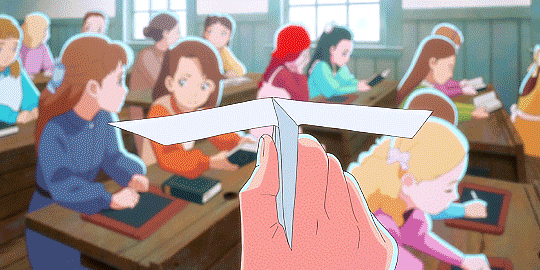


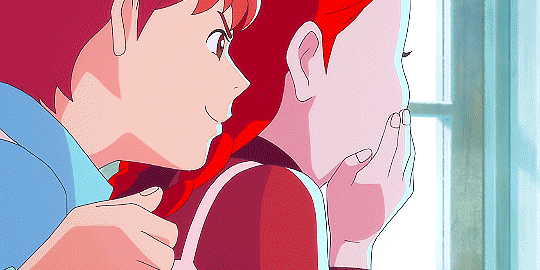
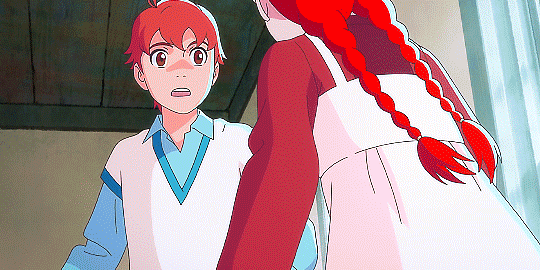

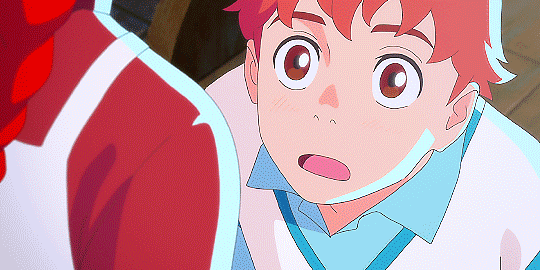

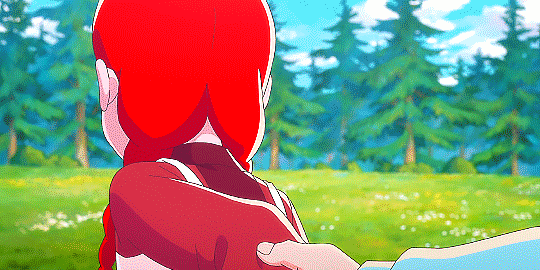
Anne & Gilbert First Meet | s01e03
#Anne Shirley#Anne Shirley 2025#Anne of Green Gables#Anne of Green Gables 2025#As the creator of an upcoming tabletop RPG inspired by the writing of Louisa May Alcott and LM Montgomery#you better bet I have been obsessing over this anime ever since the first episode aired.#How many times have I watched the episodes?#Some questions are better left unanswered.
444 notes
·
View notes
Text
Apparently there was a 1940 adaptation of Anne of Windy Poplars. I have not seen it, but the film bombed when it first released.
As far as I know, there haven't been any other adaptations of any of the books past Anne of the Island, but Anne of Avonlea and Anne of the Island were adapted by the BBC in 1975 (the series is just called Anne of Avonlea), and the adaptation is really quite good as far as book fidelity if you can get past the low production values, the fact that acting was much more stagey in the 1970s, and the absolutely terrible fake Canadian accents.
There's a brand new Anne of Green Gables anime called Anne Shirley that literally released its first episode last week (April 5th 2023 for anyone viewing this in the future), and while we only have that first episode, if the rest of the series maintains the level of quality in the first episode, the show is going to be excellent. It's planned to cover through Anne of the Island, but Japan absolutely loves Anne, so if it's successful enough, I could see it covering the later books in the series.
There's also the YouTube web series Green Gables Fables, which covers Anne of Green Gables and Anne of the Island. Technically I am cheating a little bit including this one because it's a modern day retelling of the books, but I promise that it's very true to the books in the ways that matter most. You can tell that the series is a labor of love on the part of the creators and the ways they modernize the plot points are so thoughtful and the characters are so book accurate that I really think it's worth a watch for anyone who loves the books even if you don't think that you will like a modern day adaptation.
The English versions of Anne of Green Gables, Anne of Avonlea, Anne of the Island, Anne's House of Dreams, Rainbow Valley, and Rilla of Ingleside are in the public domain in all countries, as far as I know. Anne of Windy Poplars and Anne of Ingleside were written later and remain copyrighted in the US until 2032 and 2035, if I am doing my math right. As far as I know, all of the Anne books are in the public domain in other countries, as are the Japanese translations in Japan. However, there are some weird things going on with Canadian trademarks around Anne that make adapting it more complicated.
Hopefully we can still get some good adaptations in the future in spite of that!
My kingdom for an accurate adaptation of all the Anne books
44 notes
·
View notes
Text
Reblog if you think a woman can be complete without children
Y’ALL HAVE TIME TO REBLOG THIS. IT TAKES LESS THAN FIVE SECONDS.
546K notes
·
View notes
Text
reverse gatekeeping. I am on my knees begging people to engage with the source material
#Me about all my very specific and niche interests that no knows about#I just want to talk about my favorite little guys with you.
40K notes
·
View notes
Text

I want to add to the above points that Studio Ghibli is not just Miyazaki.
My favorite Ghibli films are Whisper of the Heart and Only Yesterday, which are both films that I think could safely be called cozy and focus on themes of growing up and finding yourself rather than war or environmentalism. Miyazaki was the screenwriter for Whisper of the Heart, but it was directed by Yoshifumi Kondou (who sadly died of overwork before he could make any other Ghibli films) and Only Yesterday was both written and directed by Isao Takahata. These are not any less Ghibli films for having less involvement from Miyazaki.
Additionally, there are a ton of suggestions for tabletop RPGs that do have Nausicaä vibes in the replies and reblogs including Flying Circus, Cloud Empress, Troika, Beneath Twisted Earth, Scavenger's Reign, Worlds Beyond Numbers, Wildsea, Numenera, BREAK!, Kernel, Vaults of Varrn, and probably some others that I missed. I didn't look up any of those games myself, but with so many suggestions, there's probably something there that will appeal to people looking for Nausicaä-esque Ghibli.
I think one of the beautiful things about making a game inspired by a piece of media is that no two creators are going to pick the exact same elements of that piece of media to focus on. Even in more conventional types of adaptations, this is still true. Just look at a property like Little Women. It's been adapted to film and TV so many times, and each adaptation still manages to feel unique and tell you something about its creator.
I think there's room for both Nausicaä inspired Ghibli and cozy Ghibli. If you are only a fan of one of these, the great news is that you don't have to engage with the other. You can just decide that it isn't for you and that's okay.
Why does nobody's 'Ghibli-inspired' TTRPG ever look like this?
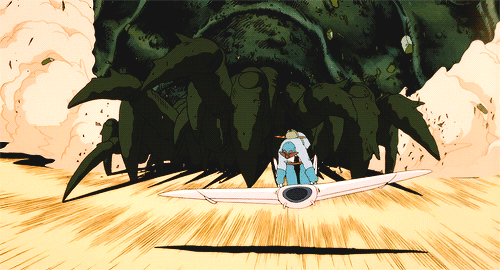


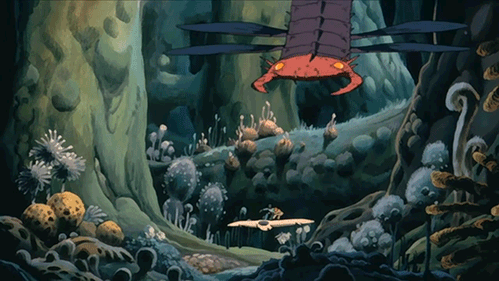
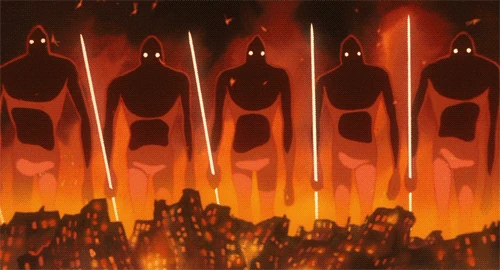
#Tabletop RPGs#Tabletop Roleplaying#Studio Ghibli#Contrary to popular belief Hayao Miyazaki is not the only creator at Studio Ghibli.#TTRPG
26K notes
·
View notes
Text
A lot of adulthood is shouting “AUGH MY LAUNDRY” hours after you put it in the washer/dryer and running to go fetch it
619K notes
·
View notes
Text
For anyone who likes both of those books, I wrote a tabletop RPG inspired by them where you can play out your own stories of childhood friendship, boundless dreams, and growing up. It's called Castles in the Air, and it comes out April 2025!

#Castles in the Air#Castles in the Air rpg#Storybrewers#Storybrewers Roleplaying#Indie Tabletop RPG#Louisa May Alcott#L.M. Montgomery#Little Women#Anne of Green Gables
2K notes
·
View notes
